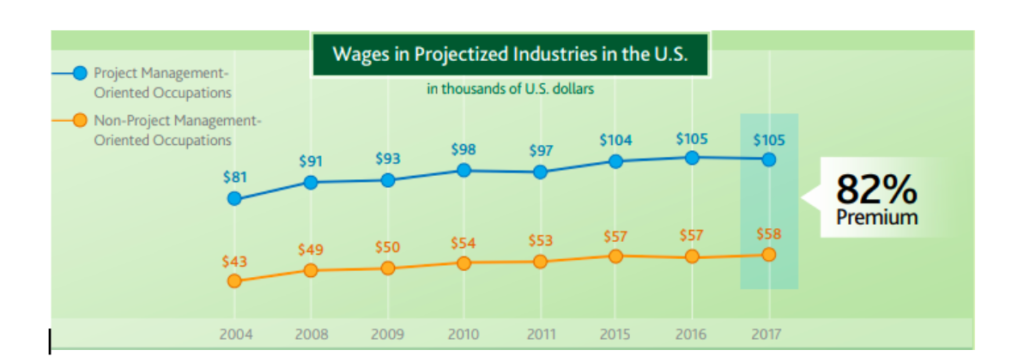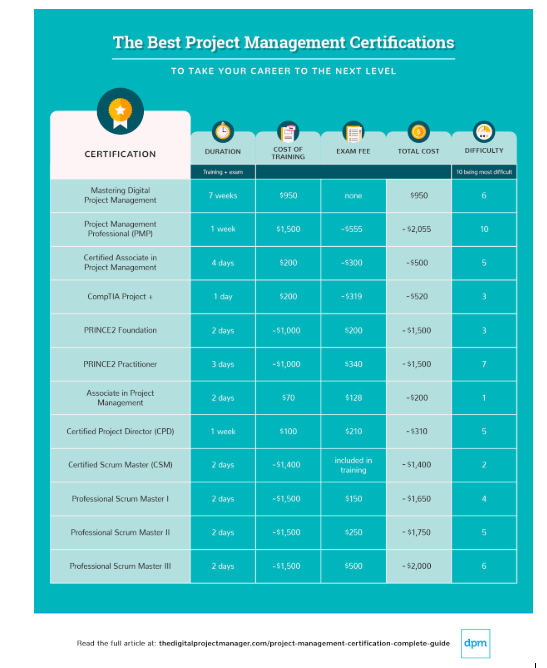The UK based magazine, Business Matters, has published a project management article on exactly that. To attempt to predict the future developments in project management, they analyzed project management trends and emerging technology and asked some of their peers in the profession. In the end, they came up with a list of five key trends in project management’s future.
Future of Project Management: Five Key Trends
- An increase in the “projectification” of work
- A higher demand for project managers
- More project managers seeking certification
- A technological revolution in project management
- Projects will be more complex and chaotic
1. An Increase in the “Projectification” of Work
Projectification of work means that, as organisations become more complex and have more moving parts, a need arises for different parts of a project to be worked on at the same time.
Traditionally, work would operate on a linear ‘production line’ style, where one team would work on a piece of a project before handing it off to the next team. This creates a series of bottlenecks, as a team could spend weeks waiting for the project to reach its stage of development. Through projectification, work divides into several sub-projects, and each project is handled by a different team (or set of teams).
An easy way to conceptualize this is to imagine an assembly line compared to a beehive. In an assembly line, the worker at the end can’t begin their job until all the other parts are finished. In a beehive, all the workers are able to work independent of other teams and adapt to change on the fly. By taking this approach, the parameters of the work are clearly defined, project managers, have clear goals and timelines to abide by. Their team is able to adapt to change, yet keep a strong organizational structure.
The projectification of work has been ongoing for several years, and the future of project management will continue this trend.
2. Higher Demand for Project Managers

As the projectification of work continues, and work divides into several projects, organisations will need to hire more project managers. The Project Management Institute (PMI) expects that ‘the project management-oriented labour force in seven project-oriented sectors is expected to grow by 33% or nearly 22 million new jobs’ by 2027.
This is a piece of very exciting project management news. In a time where many people are worried about their jobs being automated away, the PM role is expected to grow.
(Source: PMI (2017). Project Management Job Growth and Talent Gap 2017–2027.)
Not only are more jobs projected, but they will also continue to pay well above the average salary. Typically, a professional working in a project-oriented industry earn 82% more than someone working in a non-project oriented industry. This economic advantage is predicted to continue into the future of project management.
3. Project Managers Will Want a Certification
Prospective project managers and even current project managers looking for new opportunities will benefit from receiving certification. It will be another notch on the C.V. that’ll set you apart from other candidates. Organization hiring project managers look for anything that informs their hiring decision. Project management certification shows that you have the skills required to succeed in the role.
In addition, certified project managers earn, on average, 23% more than their uncertified counterparts. This is the second-largest determiner of high wages – the only other way project managers increase their earnings by such a margin is through sheer experience, where project managers with over 20 years experience earning 63% more than those with less than three.
If the thought of going back to school for project management sends shivers of anxiety through your system, fear not. With the growth of online education, it has never been easier to get trusted, professionally recognized certification. If you’re thinking that an online course sounds tempting, but you’re unsure where to start, here’s a guide to help you decide which program is right for you.

4. The Project Management Technological Revolution
In another article, we talked about how project management artificial intelligence was already changing the profession. This will only continue as future developments of project management predict work becoming more digitized.
As you’ll know, a project managers workflow is already heavily digitized. Going forward we will see further integration of platforms and devices, which will help smooth a project manager’s workflow. As well, the growth of artificial intelligence will give project managers the ability to automate more of their day-to-day administration and paperwork that comes with the job and let them focus on more important tasks such as managing projects and people.
The technological field needs project managers, too. There will be an exciting synergy where project managers help manage projects involving artificial intelligence, which in turn will make their life and workflow much easier.
5. A More Complex and Chaotic Work Environment
Just what every project manager wants to hear: that common project management challenges will continue to be prevalent. However, a more complex work environment is to be expected with the projectification of work combined with the work being digitized. It has become a bit of a project management buzzword, but part of being a project manager means having an ability to adapt and organize in the face of unexpected challenges. Agile project management is increasingly used by organizations to prevent teams from being stuck to a rigid structure.
As organizations require more flexibility from their project managers, it will be up to project managers to keep their skills sharp and their understanding of emerging trends and useful tools up to date in order to respond to their environment. Another reason why many project managers are seeking certification, enrolling in online courses, and joining project management communities.
What Do You Think?
Of course, the future is always hard to predict. What are some up and coming trends you see in the future of project management? Let me know in the comments below!